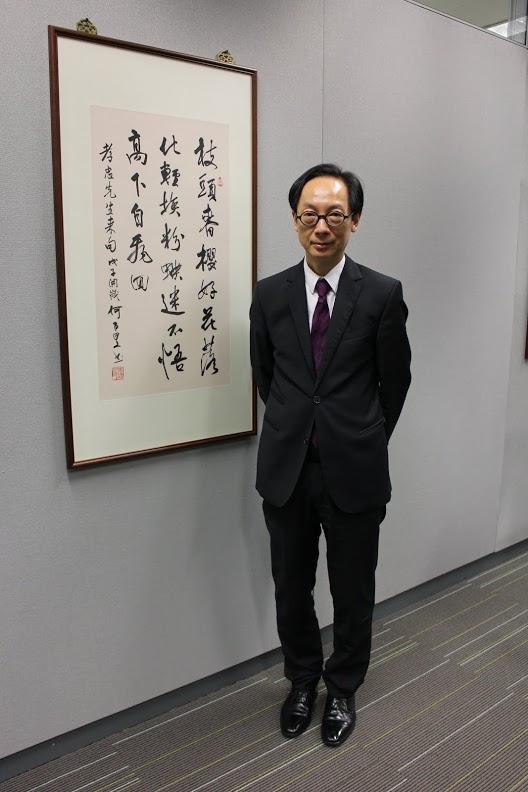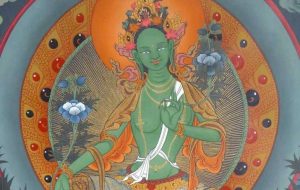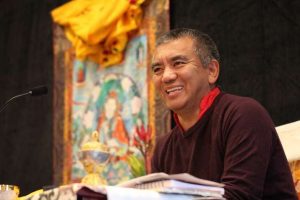
One of my aspirations as a journalist of religion is to explore how to better recount and share the teachings of Buddhism with more people. Contrary to proselytizing that hides behind reporting, I see this as an honest professional objective. Still, I could not help feeling caught off guard by Andrew Fung’s frankness when he declared unambiguously that Pure Land Buddhism (the tradition I follow and to which I am most sympathetic) is extremely hard to share with others. I had to heed his words very carefully, and not necessarily because of his position as Hang Seng’s executive director and head of global banking and markets in Hong Kong. More pertinent was the fact that he is a sincere and pious Pure Land Buddhist, so his assertion could not be taken lightly. What he was indicating was that Pure Land Buddhism urgently needs new, creative methods to appeal to those who do not currently find it attractive.
This senior banker, who oversees many financiers and large departments, understands Pure Land Buddhism as the ultimate insurance against the unknown, predicated on Amitabha’s expression of salvation and love. Amitabha’s 18th, or Primal, Vow is Mr. Fung’s spiritual solution because it promises all beings rebirth in his paradise as long as they
“sincerely and joyfully entrust themselves” to him, wish to be born there, and call his name even just 10 times. The Primal Vow is the most basic path to existential liberation in the Pure Land, yet in Mr. Fung’s view it fails to communicate with most people, let alone convincing them to take up a Pure Land practice. “I think it’s because it depends completely on faith, and whether you believe in Amitabha, his Pure Land, and his vows. Without the right karma, you simply won’t have faith or motivation to chant the name even the minimum number of times. It’s not an easy sell anywhere,” he says. In contrast, he admires the relative accessibility of Zen.
Mr. Fung, who is a regular contributor to Hong Kong’s Buddhist Compassion magazine, is forthright about his own spiritual weaknesses. “My Master, who happens to be of the Tiantai school, admonishes me for my attachment to rationality and philosophizing. He says I go round and round in circles, so to speak,” Mr. Fung admits, with a mixture of humor and genuine soberness. “My over-intellectualizing renders my practice imperfect.” Yet he has believed in the truth and value of Buddhism for many years. His mother was a Buddhist, and he recalls his first sight of a Buddha sculpture when she took him to a temple during his childhood. It was an inspirational experience. “I remember thinking to myself: What a compassionate visage!” he says. “I took Refuge after my mother passed away, but before then I had had some exposure to Buddhism when I studied Chinese philosophy and earned a bachelor of arts degree. But until my mother’s departure, my understanding of Buddhism only went as far as intellectual admiration.”
He castigates himself for this tendency to be an armchair philosopher. There is a flavor of the Pure Land emphasis on our incapability to practice Dharma as he continually stresses his concerns about being an unsatisfactory Buddhist. “A few years ago I might have refused this interview altogether,” he notes wryly. “Even now I hesitate to assert I have much to offer at all, and I have no plans to actively promote or preach Buddhism. I’d rather teach more practical matters—I recently published a book that advises people on changing jobs. But if people seek me out to write about religion, I’ll try my best.”
He refuses to style himself as a dharmabhanaka, a term given to public reciters or narrators of the Mahayana sutras and often translated into English as preachers of the Buddhist religion. This reticence might derive from his experience of banking. “As Buddhists, we must face up to the fact that we live in the worst of worlds, the least ideal universe for practicing Dharma,” he insists. “We live in the Dharma-ending age, and so many professions are mired in samsaric problems. And I can tell you that many stereotypes about banking are true.” Short-termism and greed, extreme stress, competitiveness, and other blights of the industry have led Mr. Fung to the conclusion that only Pure Land, which operates through the other-power of Amitabha rather than humanity’s ineffectual self-power, offers a certain way out.
In any case, it is not very comfortable talking about spirituality when in banking. “You just don’t talk that much about religion or philosophy in financial circles,” he observes. “People just aren’t conditioned that way.” Perhaps the assurance offered by Pure Land helps to balance the extreme uncertainty of the banking world, where one is very conceivably fired tomorrow and a single mistake can mean disaster. Yet the benefits of chanting Amitabha’s name are not completely self-centered—for Mr. Fung, belief leads to compassion, since the happiness that comes from believing in Amitabha motivates one to help others resolve their existential preoccupations.
Compassion seems to be the Buddhist value that he treasures the most. “To be compassionate is the central practice of Buddhism. Regardless of religion, those of us who were fortunate to get our lucky breaks did so because someone was kind to us and gave us a chance,” he says. “So compassion is something I try to apply professionally, as well as spiritually. As a junior in the workplace, you have no choice but to weather office politics or layoffs. Buddhist practice can help you remain still in environments you can’t control. But now that I’m in a position of authority, I try to create a better environment so those under me can enjoy a kinder, gentler workplace than the one I experienced. I’m not aiming for Utopia or a Pure Land, just a better place than when I first joined the banking community.”
Mr. Fung confesses to admiring the old ladies of “simple faith.” Assured in their conviction, they are able to chant “Namo Amituofo” thousands of times tirelessly, their prayer beads weathered with devoted and diligent handling. He wishes he could experience some of that simple faith despite the many conditions that hinder him from doing so. “Reaching the absolute certainty that Amitabha will come to receive you at death is more difficult than most imagine,” he concludes. “But this might be the most important aspect of Pure Land, and the spiritual journey I have chosen.”
This article is one of a series on how Buddhism has impacted the lives of practitioners. We welcome you to send us your story as well.














